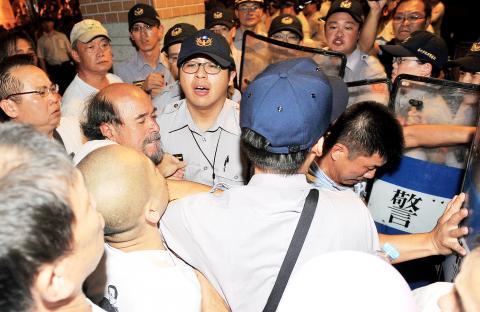State-run Taiwan Power Co (Taipower) yesterday said it is confident about the structural safety of the Fourth Nuclear Power Plant, after a government consultant expressed concerns over the quality of the controversial plant’s constrcution.
US contractor General Electric (GE), which is working on the facility in New Taipei City’s (新北市) Gongliao District (貢寮), has many years experience in the field, Taipower said, adding that it has full confidence in GE’s competence.
GE has been working on advanced boiling water reactor development since the 1990s, in cooperation with Japan’s Hitachi and Toshiba corporations, Taipower said in a statement.

Photo: Chien Jung-fong, Taipei Times
Taipower said GE has been asked to push Taipower’s downstream vendors harder to improve efficiency and problem-solving.
The Atomic Energy Council approved a newly formed engineering organization to take over the design work being carried out by Boston-based Stone and Webster Engineering, Taipower said.
Before Stone and Webster pulled out of the project in 2007, it had completed the safety designs for balancing the plant’s systems, the statement said.
Taipower said it is trying to resolve system interface and construction issues without changing the original safety designs.
The statement was issued after Lin Tsung-yao (林宗堯), a recently hired consultant on the plant’s safety monitoring committee, posted a report on Facebook on Wednesday last week detailing a number of problems with construction.
Lin questioned the quality of GE’s structural designs and its building schedule, saying that because of those issues, Taipower had failed to meet a project deadline.
Lin added that it is difficult to find solutions to problems at the Gongliao plant because there is a dearth of professionals at the Ministry of Economic Affairs and the council who understand the issues.
Seperately yesterday, the council said it submitted an amendment to the Nuclear Damage Compensation Law (核子損害賠償法) to the Legislative Yuan to increase the maximum compensation amount that a nuclear facility operators’ can be liable for to NT$15 billion (US$498.1 million) from NT$4.2 billion.
Citing the Paris Convention on Third Party Liability in the Field of Nuclear Energy and the Vienna Convention on Civil Liability for Nuclear Damage, the council said both conventions raised the maximum limit of compensation pay to about NT$15 billion after 1997.
It said that after local media reported that the compensation for nuclear damage in Taiwan is much lower than in other countries, it re-evaluated the current laws and proposed to raise nuclear facility operators’ liability.
Proposed amendments to the law included raising the maximum compensation amount, compensating for nuclear damage caused by natural disasters and extending the legal period for making claims to 30 years, the council said.
Earlier last week, civic groups Greenpeace Taiwan and Green Citizens’ Action Alliance said that in the event of a nuclear accident at the Fourth Nuclear Power Plant, the estimated potential economic loss to areas within a 50km radius would be about NT$33.9 trillion a year — about 2.4 times Taiwan’s GDP last year.
This figure does not include public healthcare costs, water pollution, cultural and educational losses, or a fall in real-estate prices, they added.
Moreover, they said the law stipulating that Taipower, not contractors, are responsible for compensation in the event of a problem in essence means victims subsidize themselves since the company would be compensating people with their own tax money.

A strong continental cold air mass is to bring pollutants to Taiwan from tomorrow, the Ministry of Environment said today, as it issued an “orange” air quality alert for most of the country. All of Taiwan except for Hualien and Taitung counties is to be under an “orange” air quality alert tomorrow, indicating air quality that is unhealthy for sensitive groups. In China, areas from Shandong to Shanghai have been enveloped in haze since Saturday, the ministry said in a news release. Yesterday, hourly concentrations of PM2.5 in these areas ranged from 65 to 160 micrograms per cubic meter (mg/m³), and pollutants were

Taiwan’s armed forces have established response protocols for a wide range of sudden contingencies, including the “Wan Chun Plan” to protect the head of state, the Ministry of Defense (MND) said today. After US President Donald Trump on Saturday launched a series of airstrikes in Venezuela and kidnapped Venezuelan President Nicolas Maduro, concerns have been raised as to whether China would launch a similar “decapitation strike” on Taiwan. The armed forces regularly coordinate with relevant agencies and practice drills to ensure preparedness for a wide range of scenarios, Vice Minister of National Defense Hsu Szu-chien (徐斯儉) told reporters before a

EVA Airways on Saturday said that it had suspended a pilot and opened an investigation after he allegedly lost his temper and punched the first officer several times as their plane was taxiing before takeoff at Los Angeles International Airport. According to a report published on Thursday by The Reporter, the incident occurred after the flight’s Malaysian first officer tried to warn the Taiwanese pilot, surnamed Wen (文), that he was taxiing faster than the speed limit of 30 knots (55.6kph). After alerting the pilot several times without response, the first officer manually applied the brakes in accordance with standard operating

Japanese Councilor Hei Seki (石平) on Wednesday said that he plans to visit Taiwan, saying that would “prove that Taiwan is an independent country and does not belong to China.” Seki, a member of the Japan Innovation Party, was born in Chengdu in China’s Sichuan Province and became a naturalized Japanese in 2007. He was elected to the House of Concilors last year. His views on the Chinese Communist Party (CCP) — espoused in a series of books on politics and history — prompted Beijing to sanction him, including barring Seki from traveling to China. Seki wrote on X that he intends